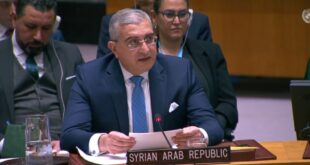Damascus, SANA- A delegation from the United Nations Population Fund (UNFPA) visited on Monday one of the Syrian Family Planning Association (SFPA) clinics in al-Halbouni area in Damascus.
The SFPA clinics provide free health services for women and children, in addition to legal and psychological consultation and various kinds of training courses.
The members of the delegation discussed with the association’ staff mechanism of cooperation to provide high quality services and support the work of the association’s plan for the current year to ensure offering services to the largest number of people who need them.
Executive director of the SFPA Lama Maoq’a said that the meeting with the delegation focused on means to develop cooperation and support, with the aim of providing additional services including free childbirth services in addition to the obstetric surgeries.
She pointed out that the SFPA seeks through cooperation with all international organizations operating in Syria to develop the quality of services it offers in all fields and to provide resources that allow for providing health and psychological care to the largest number of women, children and young people.
For her part, UNFPA Deputy Executive Director Natalia Kanem stressed the necessity of cooperation in the field of secure and safe childbirth for women, and in raising awareness in the fields of family planning, adding that the Fund seeks to reach a larger number of women, girls, and youths and to combat gender-based violence.
On the other hand, the UNFPA’s director for Arab region Luay Shabaneh said that the delegation’s visit aims at supporting the UNFPA’s team operating in Syria and assessing the additional needs for the Fund’s plans.
He pointed out that the delegation noticed during its field visits the great efforts exerted on the ground to provide services that contribute to alleviating the suffering imposed by the conditions on Syria, adding that the needs are huge and require concerted efforts to reach to the largest number of people.
The SFPA was established in 1974, working in the development field, patricularly issues of reproductive health. It has 125 fixed and mobile medical clinics and a mobile team.
Manar al-Freih / Hazem Sabbagh
 Syrian Arab News Agency S A N A
Syrian Arab News Agency S A N A

